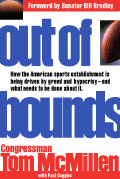Hold Coaches, Athletic Directors Accountable
Opinion
by Tom McMillen
Universities should be able to ‘claw back’ compensation when athletic programs face sanctions
It’s a drearily familiar cycle: Successful colleges coaches sail away from one job to another, leaving in their wake a university with a tarnished reputation and an athletic program facing multiple NCAA sanctions.
Take John Calipari, former coach at the University of Memphis. In 2009, he took his team to the Final Four. Shortly after Memphis lost to Missouri in the finals, Mr. Calipari announced that he would be leaving Memphis to coach the Wildcats at the University of Kentucky.
Not long after his departure, the athletic program at Memphis came under heavy scrutiny for a host of academic violations that occurred during Mr. Calipari’s tenure, including allegations that a player on the 2007-08 team committed “knowing fraudulence or misconduct in connection with his entrance examination.” On Aug. 20, 2009, the NCAA ruled that the player had been ineligible and forced Memphis to vacate the entire 2007-08 season, including the NCAA Tournament and its standing as national runner-up.
Mr. Calipari isn’t the only one in this situation.
In 2002, Coach Pete Carroll signed a five-year contract worth approximately $1 million annually to be the head football coach at the University of Southern California. By fiscal year 2007, after five very successful seasons, his total yearly compensation was over $4 million. But in January of 2010, Mr. Carroll announced that he’d be leaving USC to become the new head coach of the Seattle Seahawks on a five-year, $33 million contract.
And then what happened? Six months later, the NCAA announced sanctions against the USC football team, including a two-year bowl ban, the elimination of 30 football scholarships and forfeiture of some victories, including the Bowl Championship Series.
And at my own alma mater, the University of Maryland-College Park, the athletic department recently lost three football scholarships because of poor academic performance by the players, whose graduation rate fell below the level at which penalties kick in. The athletic director at the time, Debbie Yow, has since left to become the athletic director at North Carolina State University. While not making the astronomical salaries of some coaches, she did receive a five-year contract of $350,000 with supplemental income of $100,000.
Clearly, universities need to be more diligent in oversight of their athletic programs. But I have another question: Why aren’t well-compensated coaches and others in athletic departments held accountable for the problems they leave behind?
Recently at a meeting of the Board of Regents at the University of Maryland, I suggested that it’s time to use the Sarbanes-Oxley Act of 2002 as a model for college athletics. What Sarbanes-Oxley provided for public companies is a “clawback” provision — the ability to retract compensation, even after an executive has left a company.
We’ve seen this process work. In just one instance, two former executives of UnitedHealth Group Inc., accused of compensation abuse, agreed to give back over $600 million under the clawback provisions of Sarbanes-Oxley.
Why not have athletic directors and coaches face clawbacks too? If the NCAA imposes penalties for problems that existed during a coach or director’s employment, why not require them to return some salary and bonuses to the university — even if they have moved on to another job? After all, many coaches get bonuses for good academic performance by their teams, why shouldn’t there be penalties for poor performance?
If there were significant clawback provisions in the contracts for athletic directors and coaches as I proposed to our board of regents, I guarantee they would be more vigilant about what happens on their watch. Substantial financial incentives would encourage them to insure that rules are followed, that they wouldn’t be able to afford to look the other way.
I suspect that it will be difficult to establish this process — too many coaches are dedicated to winning at any cost. But University System of Maryland Chancellor William Kirwan is also head of the Knight Commission on Intercollegiate Athletics. I am hoping he and I can work to persuade the NCAA to institute clawback policies. But first we want to make the University of Maryland a leader in creating a process where winning is accompanied by responsibility.
http://articles.baltimoresun.com/2011-04-26/news/bs-ed-college-athletics-20110426_1_coaches-poor-academic-performance-football-scholarships








